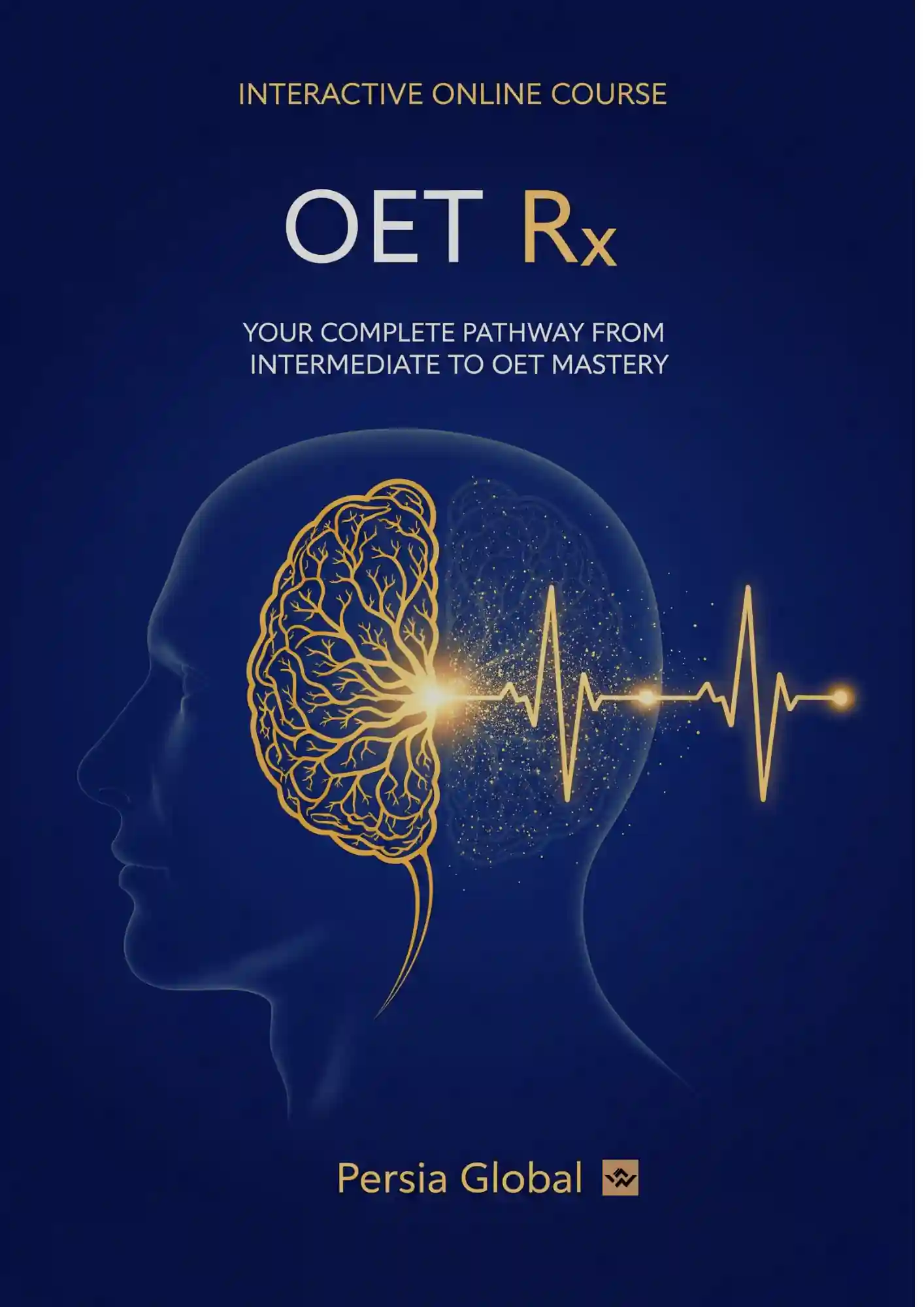OET Rx (Student Pre-Class)
Lesson 7: Advising on Medication Management
🖨️ Printable Version
To print this lesson, use the print function in your browser.
Watermark: Persia Global
Course Progress
Part 1: Lesson Objectives
By the end of this lesson, you will be able to:
- Provide clear and precise instructions on medication dosage, frequency, and route.
- Explain the importance of completing a full course of medication.
- Advise patients on what to do if they miss a dose.
- Discuss potential drug interactions and contraindications in simple terms.
Lesson Video
Coming Soon
This video will be available for the offline course version.
Part 2: Vocabulary & Examples
Study the words, their pronunciations, Persian translations, and example sentences to understand how they are used in context.
General Vocabulary
قطع کردن، نصف کردن
You should never cut these tablets in half, as they have a special coating that must remain intact.
چرخه، دوره
This chemotherapy treatment is administered in a three-week cycle, with a rest period in between to allow your body to recover.
روزانه
This is a daily medication that should be taken at approximately the same time each morning.
آسیب
Taking more than the recommended dose can cause serious liver damage, so it's crucial to follow the instructions.
خطر
There is a danger of a drug interaction if you take this medication with certain herbal supplements.
خطرناک
It can be dangerous to stop taking your blood pressure medication suddenly without consulting your doctor.
دادهها، اطلاعات
The clinical data shows that this medication is highly effective when taken correctly.
رسیدگی کردن به
This leaflet explains how to deal with common side effects should they arise.
تصمیم گرفتن
We need to decide on the best course of action, considering the potential benefits and risks of this new prescription.
تصمیم
The final decision to start this medication rests with you, after I have provided you with all the information.
حذف کردن/از قلم انداختن
If you omit a dose, please check the patient leaflet for instructions; do not double the next one.
کاهش دادن
The primary goal of this medication is to decrease the level of inflammation in your joints.
عمیق
This medication is administered via a deep intramuscular injection into the gluteal muscle.
تعریف کردن
Let me define what we mean by a "drug interaction"; it's when one medication affects how another one works.
قطعی، مشخص
We need a definite answer on whether you've been taking the medication consistently.
قطعا
You should definitely avoid drinking alcohol while on this course of antibiotics.
درجه، میزان
The degree of pain relief you experience will depend on your adherence to the prescribed dosage.
به تاخیر انداختن
Please do not delay starting the antibiotic course, as the infection could worsen.
تحویل، روش تجویز
The patch provides a slow and continuous delivery of the medication into your system over 24 hours.
خواستار شدن، ایجاب کردن
The severity of your condition will demand strict adherence to this medication regimen.
Medical Vocabulary
ممنوعیت مصرف
A history of kidney disease is a major contraindication for this particular medication.
دوره دارو
It is crucial to complete the entire 10-day course of medication, even if you start to feel better.
دفعات، تکرار
The frequency for this tablet is twice daily, once in the morning and once in the evening.
تداخل دارویی
There is a known interaction between this anticoagulant and aspirin, so you must avoid it.
دوز فراموش شده
The patient information leaflet provides clear instructions on what to do in the event of a missed dose.
بدون نسخه
You should still check with the pharmacist to ensure this over-the-counter remedy doesn't interact with your prescribed medication.
داروساز
The pharmacist is an excellent resource if you have any questions about how to take your medication.
نسخه
I am writing you a prescription for a seven-day course of antibiotics.
مسیر تجویز دارو
The route of administration for this insulin is subcutaneous, meaning you inject it just under the skin.
اثربخشی
The efficacy of this antibiotic depends on completing the full course as prescribed.
Part 3: Pre-Class Practice Tests
Reading Task:
Excerpt from a Patient Information Leaflet (PIL) for Warfarin
Warfarin is an anticoagulant used to prevent blood clots. The dosage is patient-specific and requires regular blood tests (INR) to monitor its effect. A major contraindication for Warfarin is pregnancy. Furthermore, significant drug interactions can occur. You must inform your doctor of all other medications you are taking, including over-the-counter (OTC) drugs and herbal supplements like St. John's Wort, as these can dangerously increase or decrease the drug's effect. If you miss a dose, contact your clinic immediately for advice. Do not take a double dose to "catch up". Adherence to this advice is critical to avoid the dangerous consequences of incorrect dosage, such as severe bleeding or clotting.
Question: According to the leaflet, what should a patient do first if they realise they have missed a dose of Warfarin?
Listening Task (Part B Simulation):
Scenario: You will hear a senior nurse briefing a junior colleague about a patient's medication.
Task: What is the senior nurse emphasizing to her colleague?
Part 4: Answer Key for Pre-Class Work
Reading Answer: b) Immediately contact their medical clinic.
Listening Answer: b) The importance of the timing of the medication.
Part 5: In-Class Preparation
Be prepared to discuss the vocabulary and practice the following tasks in class.
Speaking Task: OET Role-Play Card
Setting: Community Pharmacy
Patient: A 30-year-old patient picking up a prescription for an antibiotic (e.g., Amoxicillin) for a throat infection. They mention they are also taking an oral contraceptive pill.
Task: Greet the patient and confirm the prescription. Clearly explain the dosage and frequency. Explain the importance of completing the full course. Advise them about the potential drug interaction and recommend using additional precautions. Check for understanding and answer any questions.
Writing Task:
You are the pharmacist from the speaking scenario. Create a small, clear sticker with concise instructions to put on the medication box. Include the key warning about the potential interaction discussed.
